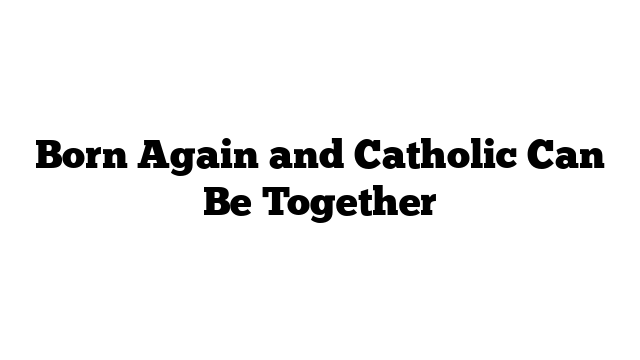Inter-faith & Inter-denomination
Born Again and Catholic Can Be Together
Introduction
In today’s diverse world, it is not uncommon for individuals to come from different religious backgrounds and find themselves in relationships with people from different faiths. One such scenario is when a Catholic person finds themselves dating or in a relationship with a Born Again Christian. This situation often brings up questions and concerns about whether these two individuals can have a successful relationship and ultimately marry each other.
Understanding the Faiths
Before delving into whether Born Again Christians and Catholics can be together, it is important to understand the fundamentals of each faith. Born Again Christianity is a branch of Protestant Christianity that emphasizes a personal relationship with Jesus Christ and the experience of being “born again” through a transformative spiritual awakening.
On the other hand, Catholicism is a specific denomination within Christianity that follows the teachings and traditions of the Catholic Church, with the Pope as its spiritual leader. Catholics hold sacraments and the practices of the church in high regard, including the importance of Mary, the mother of Jesus, and the belief in transubstantiation during the Eucharist.
Respecting Differences
In any interfaith relationship, it is crucial for both individuals to respect and acknowledge the differences in their beliefs. It is essential to have open and honest conversations about religion, seeking understanding and finding common ground. This mutual respect can lay a strong foundation for a successful relationship.
Finding Common Values
Despite the differences in their beliefs, Born Again Christians and Catholics often share common values rooted in Christianity. These values include love, forgiveness, compassion, and serving others. By focusing on these shared values, couples can build a solid foundation for their relationship and support each other’s spiritual journeys.
Seeking Guidance and Support
Navigating an interfaith relationship can be challenging, so seeking guidance and support from religious leaders or mentors is highly recommended. Speaking to a priest, pastor, or counselor who has experience working with interfaith couples can provide valuable insight and advice on how to manage the challenges that may arise.
Interfaith Dialogue and Learning
Engaging in interfaith dialogue and continuous learning can be enriching for both individuals in the relationship. Attending each other’s religious services or events, reading religious texts together, and discussing theological topics can foster understanding and strengthen the bond between the couple.
Resolving Differences
While differences in beliefs may pose challenges, open and honest communication is key to resolving conflicts. It is important for couples to express their concerns and feelings while actively listening and seeking compromise. This can help find solutions that respect both individuals’ faiths and values.
Future Considerations
If the relationship progresses towards marriage, there may be additional considerations to take into account. For Catholic individuals, getting married in a Catholic Church is typically important, and the Catholic partner may need approval from their Bishop to marry a person of a different faith. Understanding and respecting the Catholic partner’s commitment to their faith is crucial in this process.
Raising Children
Another important aspect to discuss in an interfaith relationship is how to raise children, particularly regarding their religious upbringing. Open and respectful communication is vital in navigating this sensitive topic. It may involve compromises or finding a middle ground that respects the beliefs of both parents.
Conclusion
While interfaith relationships can come with unique challenges, they also offer an opportunity for growth, understanding, and a shared spiritual journey. Born Again Christians and Catholics can build a successful relationship if they approach it with respect, open-mindedness, and a commitment to love and support each other along their faith paths. With mutual understanding and compromise, couples can navigate the complexities of their different beliefs, finding unity in their shared values and love for one another.

